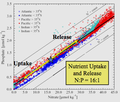Phosphate
Overview of phosphate use in biological systems and industry




Phosphate is an inorganic chemical and a salt of phosphoric acid. In organic chemistry, a phosphate, or organophosphate, is an ester of phosphoric acid. Phosphates are essential for life, playing a critical role in biochemistry and ecology.
Biological Importance[edit]
Phosphates are vital components of DNA, RNA, ATP, and phospholipids, which form all cell membranes. They are involved in energy transfer through the formation of high-energy phosphate bonds in adenosine triphosphate (ATP) and guanosine triphosphate (GTP). Phosphates also play a crucial role in cell signaling as part of phosphorylation processes.
DNA and RNA[edit]
Phosphates form the backbone of DNA and RNA molecules, linking together the nucleotides in a chain through phosphodiester bonds. This structure is essential for the stability and function of genetic material.
Energy Transfer[edit]
ATP, the primary energy carrier in cells, contains three phosphate groups. The hydrolysis of the terminal phosphate group releases energy that is used in various cellular processes, including muscle contraction, nerve impulse propagation, and biosynthesis.
Cell Signaling[edit]
Phosphorylation, the addition of a phosphate group to a protein or other organic molecule, is a common mechanism for regulating protein function and signaling pathways. This process is mediated by enzymes known as kinases and is reversed by phosphatases.
Industrial and Agricultural Use[edit]
Phosphates are widely used in agriculture as fertilizers. They are a key component of superphosphate and triple superphosphate fertilizers, which are used to enhance soil fertility and crop yield. In industry, phosphates are used in the production of detergents, food additives, and water treatment chemicals.
Fertilizers[edit]
Phosphate fertilizers are essential for modern agriculture. They provide phosphorus, a critical nutrient that plants need for growth and development. The use of phosphate fertilizers has significantly increased agricultural productivity worldwide.
Detergents[edit]
Phosphates are used in detergents to soften water and enhance cleaning efficiency. However, their use has been reduced in many countries due to environmental concerns, as phosphates can contribute to eutrophication in water bodies.
Food Additives[edit]
In the food industry, phosphates are used as leavening agents, acidity regulators, and emulsifiers. They help maintain the texture and stability of processed foods.
Environmental Impact[edit]
The excessive use of phosphate fertilizers and detergents can lead to environmental issues such as eutrophication, which is the over-enrichment of water bodies with nutrients. This can cause algal blooms, deplete oxygen levels, and harm aquatic life.
Images[edit]
-
Phosphate
-
Phosphate
-
Phosphate
-
Phosphate
-
Phosphate
-
Phosphate
Also see[edit]
| Branches of chemistry | ||||||||||
|---|---|---|---|---|---|---|---|---|---|---|
|
| Biochemistry | ||||||||||
|---|---|---|---|---|---|---|---|---|---|---|
This biochemistry related article is a stub.
|
Ad. Transform your life with W8MD's Budget GLP-1 injections from $49.99


W8MD offers a medical weight loss program to lose weight in Philadelphia. Our physician-supervised medical weight loss provides:
- Weight loss injections in NYC (generic and brand names):
- Zepbound / Mounjaro, Wegovy / Ozempic, Saxenda
- Most insurances accepted or discounted self-pay rates. We will obtain insurance prior authorizations if needed.
- Generic GLP1 weight loss injections from $49.99 for the starting dose of Semaglutide and $65.00 for Tirzepatide.
- Also offer prescription weight loss medications including Phentermine, Qsymia, Diethylpropion, Contrave etc.
NYC weight loss doctor appointmentsNYC weight loss doctor appointments
Start your NYC weight loss journey today at our NYC medical weight loss and Philadelphia medical weight loss clinics.
- Call 718-946-5500 to lose weight in NYC or for medical weight loss in Philadelphia 215-676-2334.
- Tags:NYC medical weight loss, Philadelphia lose weight Zepbound NYC, Budget GLP1 weight loss injections, Wegovy Philadelphia, Wegovy NYC, Philadelphia medical weight loss, Brookly weight loss and Wegovy NYC
|
WikiMD's Wellness Encyclopedia |
| Let Food Be Thy Medicine Medicine Thy Food - Hippocrates |
Medical Disclaimer: WikiMD is not a substitute for professional medical advice. The information on WikiMD is provided as an information resource only, may be incorrect, outdated or misleading, and is not to be used or relied on for any diagnostic or treatment purposes. Please consult your health care provider before making any healthcare decisions or for guidance about a specific medical condition. WikiMD expressly disclaims responsibility, and shall have no liability, for any damages, loss, injury, or liability whatsoever suffered as a result of your reliance on the information contained in this site. By visiting this site you agree to the foregoing terms and conditions, which may from time to time be changed or supplemented by WikiMD. If you do not agree to the foregoing terms and conditions, you should not enter or use this site. See full disclaimer.
Credits:Most images are courtesy of Wikimedia commons, and templates, categories Wikipedia, licensed under CC BY SA or similar.
Translate this page: - East Asian
中文,
日本,
한국어,
South Asian
हिन्दी,
தமிழ்,
తెలుగు,
Urdu,
ಕನ್ನಡ,
Southeast Asian
Indonesian,
Vietnamese,
Thai,
မြန်မာဘာသာ,
বাংলা
European
español,
Deutsch,
français,
Greek,
português do Brasil,
polski,
română,
русский,
Nederlands,
norsk,
svenska,
suomi,
Italian
Middle Eastern & African
عربى,
Turkish,
Persian,
Hebrew,
Afrikaans,
isiZulu,
Kiswahili,
Other
Bulgarian,
Hungarian,
Czech,
Swedish,
മലയാളം,
मराठी,
ਪੰਜਾਬੀ,
ગુજરાતી,
Portuguese,
Ukrainian




